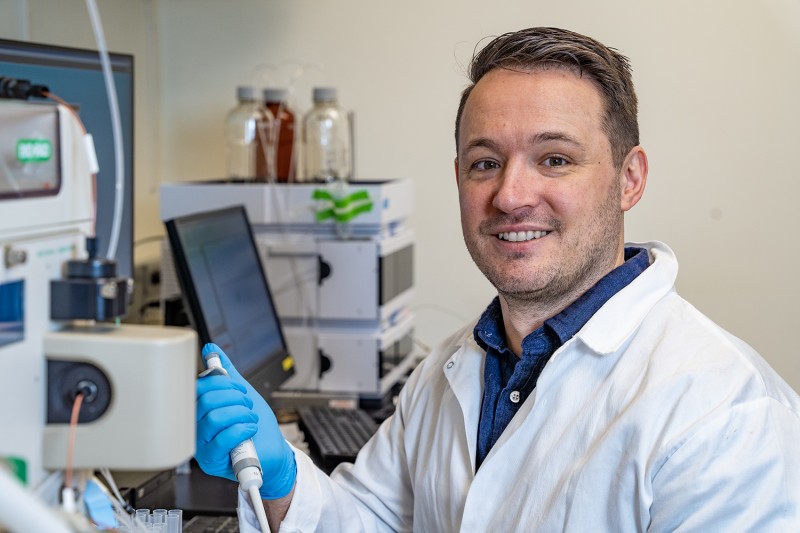Researchers Develop New Method for Image-Guided Radionuclide Therapy
 A team of Stony Brook University researchers developed a new method for image-guided radionuclide therapy that uses a two-step process with specially-modified antibodies to target the cancerous tumors, followed by a radioligand designed to bind specifically to the modified antibody.
A team of Stony Brook University researchers developed a new method for image-guided radionuclide therapy that uses a two-step process with specially-modified antibodies to target the cancerous tumors, followed by a radioligand designed to bind specifically to the modified antibody.
Preliminary studies have shown that the approach can drastically reduce adverse effects while remaining extremely effective at targeting and killing the cancer cells. The promise of this technology has led to an exclusive licensing agreement with Perspective Therapeutics, Inc., headquartered in Seattle, WA.
The licensing agreement with Perspective Therapeutics is through the Research Foundation for State University of New York’s (SUNY), a private, non-profit, education corporation that manages research administration and intellectual property for and on behalf of SUNY.
Nuclear imaging and targeted radionuclide therapy with biological molecules are a rapidly growing approach for the diagnosis, staging, and treatment of cancer and other pathologies such as inflammation and infection. Traditionally, the therapy has primarily been used in specific diseases such as thyroid cancer, bone cancer metastases, and neuroendocrine cancer. However, a major potential drawback of existing technologies is a resulting high radiation dose to healthy tissues from the combination of long-lived radionuclides and long biological half-life of the targeting molecules.
Stony Brook University radiology researchers Jacob L. Houghton, PhD, and Vilma I.J. Jallinoja, PhD, developed a new technology that overcomes these hurdles to more widespread use of radionuclide therapy. The platform involves using a small molecule that is labeled with a therapeutic radionuclide known as a radioligand, along with a modified monoclonal antibody – such as those used in immunotherapies to target cancer cells – in a two-step process. The platform enabled them to use the specificity of monoclonal antibodies to target cancer and take advantage of a small molecule radioligand in a manner that retains the efficacy of the therapy while substantially improving the safety through a reduction in radiation toxicity.
Houghton, an Assistant Professor in the Department Radiology in the Renaissance School of Medicine (RSOM), and researcher in the Stony Brook Cancer Center, conducts research on targeted radionuclide therapy for diagnosing and treating cancer. He will continue to collaborate with scientists at Perspective Therapeutics as they further develop the technology. Jallinoja is no longer at Stony Brook.
“Our technology allows the use of such molecules for imaging and therapy while abrogating the concerns of radiation toxicity by using a pre-targeting technique which enables us to ‘label’ the biological molecule after it has been delivered to the target tissue and cleared from peripheral tissues,” explains Houghton.
Specifically, the pre-targeting radionuclide approach involves these steps: an antibody that has been modified to include an artificial binding group is administered to target to the tumor; then the radioligand carries the radionuclide to the tumor which binds specifically to the artificial binding group on the antibody. The radioligand rapidly accumulates in the tumor via this highly-specific interaction, and the unbound radioligand clears the body quickly. This process allows for optimal delivery of the radioactivity to the tumor, with little interaction with healthy tissue and organs.
This method differs from traditional approaches to targeted radionuclide therapy that directly attaches the radioactive payload to the targeting antibody, which can take days to accumulate in the tumor, leading to increased exposure to healthy tissues.
“By embracing a strategy that leverages the precision of monoclonal antibodies and the versatility of small molecules, Perspective is poised to redefine the landscape of radiation therapy,” says Thijs Spoor, Chief Executive Officer at Perspective Therapeutics. “One of our core missions as a company is to deliver safe and effective radiotherapies to patients.”
The team at Stony Brook University’s Intellectual Property Partners (IPP) worked to create the license with Perspective and develop a partnership to bridge new radiopharmaceutical technologies into eventual diagnostics and treatments.
“We are excited to partner with Perspective Therapeutics to advance this novel CB7-Adma pre-targeting platform toward clinical use. The combination of Perspective’s propriety radionuclide chelators and our pre-targeting platform has the potential to significantly improve clinical outcomes in a variety of cancer indications,” says Sean Boykevisch, PhD, Director of the IPP. “This partnership is a great example of how IPP works with Stony Brook inventors, helping them bridge their innovations with societal benefit in collaboration with industry partners.”
